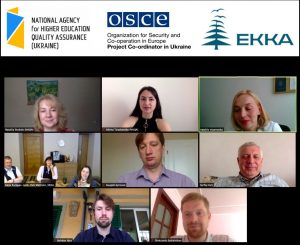With the support of OSCE Project Coordinator in Ukraine on June 18 an Agency to Agency meeting between NAQA (Ukraine) and EKKA (Estonia) was held online. Estonian Quality Agency for Higher and Vocational Education (EKKA) is the national quality assurance agency responsible for evaluations of higher and vocational education in Estonia. EKKA’s mission is to promote quality in the field of education and thereby increase the competitiveness of the Estonian society. EKKA is a full member of ENQA, INQAAHE, CEENQA, EQAR.
NAQA was represented by Serhiy Kvit, NAQA Head, Nataliia Stukalo and Andriiy Butenko – NAQA Vice-Heads, Albina Tsiatkovska, International Project Manager. From EKKA side the meeting was attended by Heli Mattisen, Director, Kaija Kumpas-Lenk, Director for Development, Hillar Bauman, Assessment Director.
The meeting was moderated by Natalia Stupnytska, Rule of Law and Human Rights Programme Manager of the OSCE Project Coordinator in Ukraine. Other OSCE representatives – Oleksandr Sydielnikov, Rule of Law and Human Rights Project Officer of the OSCE Project Co-ordinator in Ukraine and Bohdan Ides, Rule of Law and Human Rights Intern of the OSCE Project, also took part in the discussion.
Estonia is a quite small Europe country with only about 20 higher education institutions. Responsibilities for quality assurance are divided between the government (or Ministry of Education), institutions and EKKA. Moreover, institutions are at the core of this system. That means that the main responsibility for the quality and continuous improvement of the provided education lies with the institutions. EKKA`s role is to promote the quality in cooperation with HEIs through external assessments.
Another topic that was discussed is the institutional accreditation that is provided by EKKA. In Estonia, only institutions of higher education which have passed the evaluation of quality of studies are allowed to provide higher education. Institutional accreditation is external evaluation which assesses the conformity of the institution’s management, work procedure, study and research activities and study and research environment to legislation and the goals and development plan of the institution, provides feedback about the management and working of a university as a whole. Institutional accreditation does not result in granting HEIs the right to have self-accreditation.
The parties also discussed the future cooperation as well as joint projects and initiatives.

